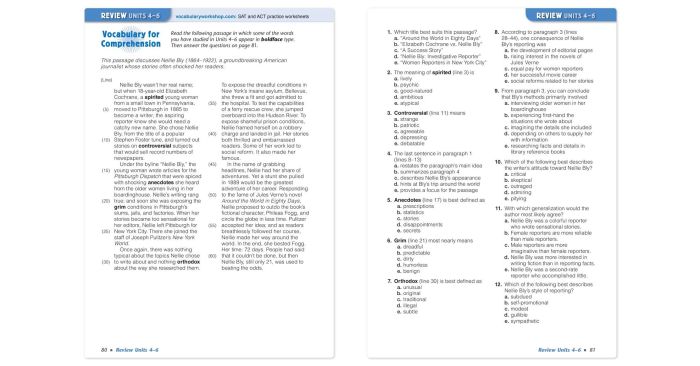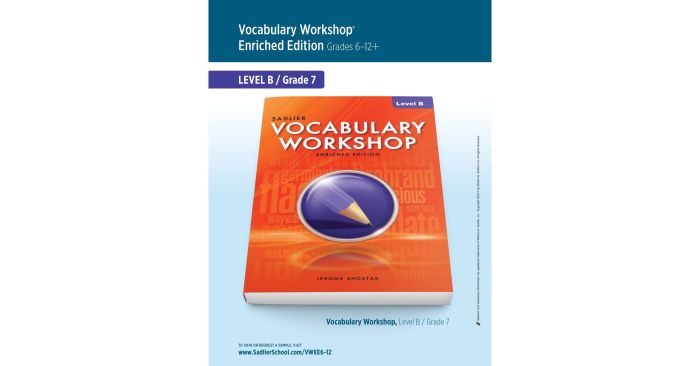Embark on an enlightening journey through Vocabulary Unit 8 Level F, where words come alive and language takes flight. This comprehensive unit delves into the intricacies of vocabulary, empowering you to expand your linguistic horizons and conquer communication challenges with finesse.
Prepare to delve into the depths of word meanings, explore the nuances of grammar, and master strategies for vocabulary retention. Engage in interactive exercises and activities designed to ignite your curiosity and reinforce your understanding.
Vocabulary Comprehension
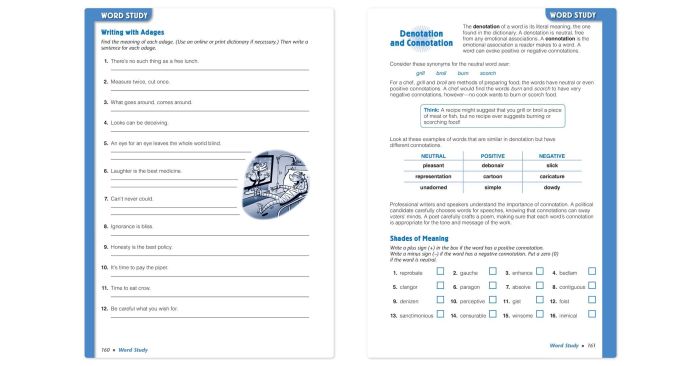
In this unit, we will delve into the fascinating world of vocabulary, exploring the intricate meanings and diverse applications of key words. We will uncover the definitions and nuances of these words, examining how they shape our language and enhance our communication.
Word Definitions and Meanings
At the heart of vocabulary comprehension lies the understanding of word definitions and meanings. Each word carries a unique significance, and it is essential to grasp its precise interpretation to effectively convey our thoughts and ideas.
For instance, the word “ephemeral” means “lasting for a very short time.” This adjective aptly describes the fleeting nature of moments that seem to slip away before we can fully grasp them. In contrast, the word “perennial” signifies “lasting for an indefinitely long time.”
It captures the enduring quality of certain plants that return year after year, symbolizing resilience and continuity.
Parts of Speech and Word Usage
The part of speech of a word plays a crucial role in determining its usage and function within a sentence. Nouns, verbs, adjectives, and adverbs each serve distinct purposes, influencing the overall meaning and structure of our language.
For example, the noun “enthusiasm” represents a strong feeling of excitement or eagerness. When used as a subject, it can initiate a sentence, such as “Enthusiasm fueled her pursuit of knowledge.” Alternatively, the verb “enthuse” conveys the act of inspiring enthusiasm in others.
In a sentence like “Her speech enthused the audience,” it serves as the action that transforms the subject.
Vocabulary Application
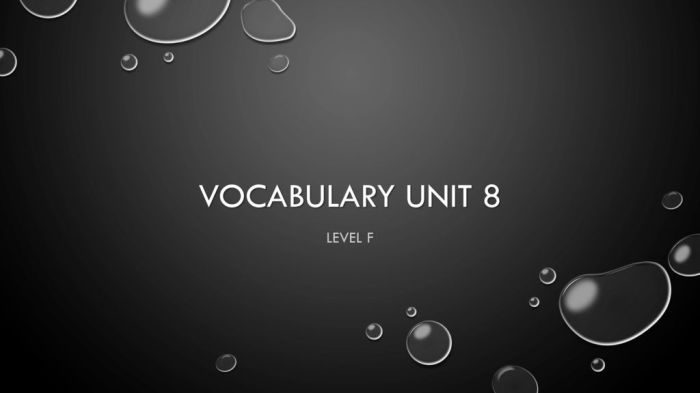
Vocabulary application is a crucial step in language learning, as it helps learners put their vocabulary knowledge into practice and improve their overall proficiency. Engaging exercises and activities can enhance comprehension, strengthen retention, and make learning more enjoyable.
One effective way to apply vocabulary is through interactive games. For instance, a game like “Vocabulary Charades” can involve learners acting out a word or phrase for their team to guess. This not only reinforces vocabulary understanding but also encourages teamwork and communication.
For those studying vocabulary unit 8 level f, you’re in luck! Here’s a fun puzzle to help you practice your new words: part of a chest crossword . Can you solve it? Give it a try and let us know how you do! It’s a great way to test your vocabulary and have some fun at the same time.
So, what are you waiting for? Give the puzzle a try today!
Strategies for Improving Vocabulary Retention
Improving vocabulary retention is essential for long-term language proficiency. Here are some effective strategies:
- Spaced Repetition:Reviewing vocabulary at increasing intervals helps strengthen memory and prevent forgetting.
- Active Recall:Trying to recall words from memory, rather than simply re-reading them, forces the brain to work harder and improves retention.
- Contextual Learning:Learning vocabulary in context, such as through reading or listening, helps learners understand how words are used and makes them more memorable.
- Visual Aids:Using flashcards, diagrams, or images can provide visual cues that enhance memory and facilitate retrieval.
- Mnemonic Devices:Creating rhymes, songs, or stories can help learners associate words with other information, making them easier to remember.
Vocabulary Expansion: Vocabulary Unit 8 Level F

Expanding your vocabulary is crucial for enhancing your communication skills and deepening your understanding of language. This section delves into various strategies to expand your vocabulary, including identifying synonyms, antonyms, and related words, organizing vocabulary into categories, and exploring the etymology of words.
Identifying Synonyms, Antonyms, and Related Words
Synonyms are words that have the same or similar meanings, while antonyms are words that have opposite meanings. Identifying synonyms and antonyms helps you understand the nuances of language and express yourself more precisely. Related words, such as hyponyms (more specific terms) and hypernyms (more general terms), further enhance your vocabulary by establishing semantic relationships between words.
Organizing Vocabulary into Categories
Organizing vocabulary into semantic categories or concept maps helps you group words with similar meanings or concepts. This facilitates recall and retrieval of words when needed. Semantic categories can be based on topics, parts of speech, or any other logical criteria that suits your learning style.
Etymology: Exploring the History of Words
Etymology is the study of the origin and history of words. Understanding the etymology of words provides insights into their original meanings and how they have evolved over time. Etymology can help you appreciate the richness and complexity of language and make your vocabulary more sophisticated.
Vocabulary in Context
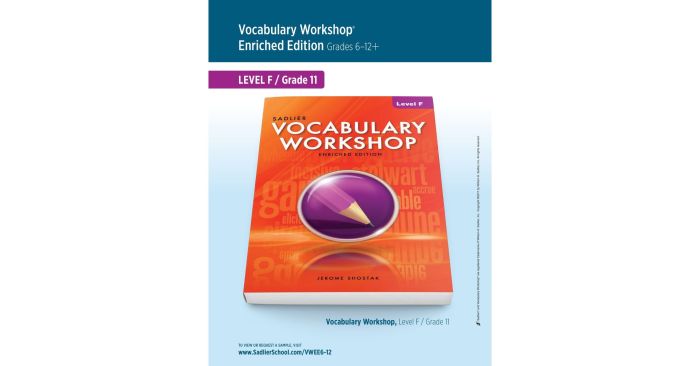
Vocabulary is the foundation of language, and understanding the meaning and usage of words is essential for effective communication. In this section, we will explore how vocabulary contributes to the overall meaning and tone of a text, and how it can enhance comprehension and critical thinking.
Identifying Key Vocabulary Words, Vocabulary unit 8 level f
The first step in analyzing a text for vocabulary is to identify the key words that are essential for understanding the meaning. These words may be unfamiliar, technical, or have multiple meanings. By identifying and defining these key words, readers can gain a deeper understanding of the text.
- Example:In the sentence “The professor’s dissertationwas a comprehensive study of the impact of social media on political discourse,” the word “dissertation” is a key vocabulary word that requires definition.
Contribution to Meaning and Tone
Vocabulary plays a crucial role in conveying the overall meaning and tone of a text. The choice of words can create a specific atmosphere, evoke emotions, and influence the reader’s interpretation.
- Example:A text that uses positiveand optimisticvocabulary, such as “joyful,” “hopeful,” and “inspiring,” will likely convey a positive tone, while a text that uses negativeand pessimisticvocabulary, such as “gloomy,” “despairing,” and “bleak,” will convey a negative tone.
Enhancing Comprehension and Critical Thinking
A strong vocabulary is essential for enhancing comprehension and critical thinking. By understanding the meaning and usage of words, readers can better understand the nuances of a text and make more informed judgments about its content.
- Example:In a historical text, understanding the meaning of the word ” imperialism” is crucial for comprehending the motivations and consequences of colonial expansion.
FAQ Explained
What is the focus of Vocabulary Unit 8 Level F?
Vocabulary Unit 8 Level F concentrates on enhancing vocabulary comprehension, application, expansion, and its role in context.
How can I improve my vocabulary retention?
This unit provides a range of strategies to enhance vocabulary retention, such as spaced repetition, context-based learning, and active recall.
